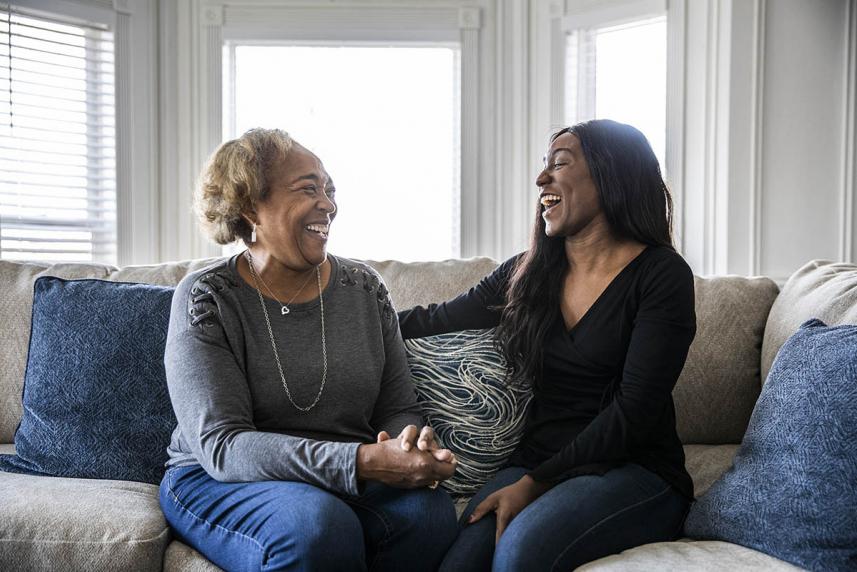
Sign up for our brain fitness newsletter and get research-backed tips and activities delivered straight to your inbox.
Not all memory issues signal a dementia diagnosis. A less serious condition could be the culprit.

Worried about a loved one? Maybe you’ve noticed that they seem forgetful or confused. But chances are, nobody in the family is talking about it.
Memory problems — and other cognitive issues — are topics that lots of people avoid, especially with the doctor. That’s because of a fear that the diagnosis may be Alzheimer’s disease or another form of dementia.
There’s no question that dementia is a devastating condition. But it’s probably not as common as you think. It affects more than 7 million people over the age of 65. Yet the proportion of older Americans with dementia actually declined from 13% in 2011 to 10% in 2019, according to the Population Reference Bureau.
Plus, the symptoms you’re concerned about might point to something far less serious. Many minor and treatable problems can affect memory and mimic signs of dementia. So it’s important to talk to the doctor about whatever unusual symptoms your loved one may be experiencing.
“Unfortunately, there’s still a lot of stigma with psychiatric diagnoses, but this is something that should never be overlooked,” says Patricia M. Colapietro, M.D. She’s a neurologist with University of Cincinnati Health in Ohio.
The key: Be honest and help your loved one seek the care they need. Puzzled and concerned? Not sure what to do? If you’ve got questions, we’ve got answers.
Dementia is a general term for a decline in mental ability severe enough to interfere with daily life, according to the Alzheimer’s Association. Alzheimer’s is a specific disease that is the most common cause of dementia. Dementia impairs at least two brain functions. That could mean memory loss and judgment. But it could also involve impulsiveness or difficulty making decisions.
The important thing: Don’t jump to conclusions. No matter what the symptoms are, your loved one may simply be experiencing a normal part of aging, not dementia.
“As we all get older, our brains get older too, and normal aging may cause some memory problems and forgetfulness,” Dr. Colapietro explains. “There’s no ‘normal’ target, but we should all be within the average range of cognitive function according to our age and level of education.”
First, don’t make an amateur diagnosis. Talk to a doctor. Early testing is key to determining if the problem is simply part of the normal aging process, dementia, or something entirely different. But time is of the essence. The sooner you can get a diagnosis and begin treatment, the better, says Dr. Colapietro.
The most obvious symptoms are memory problems. But they can be easy to miss, especially if you’re not with your loved one all the time, Dr. Colapietro says. When you’re together, though, watch for these common symptoms:
Other red flags may be:

Sign up for our brain fitness newsletter and get research-backed tips and activities delivered straight to your inbox.
It’s important to rule out conditions that used to be called “pseudo-dementias,” or fake dementias, says Dr. Colapietro. Those are conditions that may mimic dementia — and they can make memory problems even worse if they’re not addressed. Luckily, most of them are treatable. And your loved one’s primary care provider can investigate and screen for many of them. They include:
Maybe. Talk to the doctor about all the medications they take — including over-the-counter (OTC) ones. Cognitive problems can be caused by certain OTC medications, including:
Why? These medications can block the action of a brain chemical that sends messages between your body’s cells. That can lead to cognitive and physical impairment in older adults. Be sure your loved one brings a list of all the medications they take whenever they visit the doctor.
If your loved one’s provider diagnoses a condition that mimics dementia, they’ll recommend a course of treatment and may prescribe medication. The provider will also want to make sure the problem isn’t Parkinson’s disease, stroke, meningitis, cancerous tumors, or complications of cancer or cancer treatment, Dr. Colapietro says.
If your loved one does turn out to have dementia, they (and you) don’t have to navigate it alone. There are many resources available, both for patients and the family members who care for them. Start here to find the help you need.
Did you know that access to BrainHQ may be included with your Medicare Advantage plan? Check your eligibility today.
Additional sources
Dementia trends in the U.S.: Population Reference Bureau
Dementia overview: National Institute on Aging
Signs and symptoms of dementia: Alzheimer’s Association